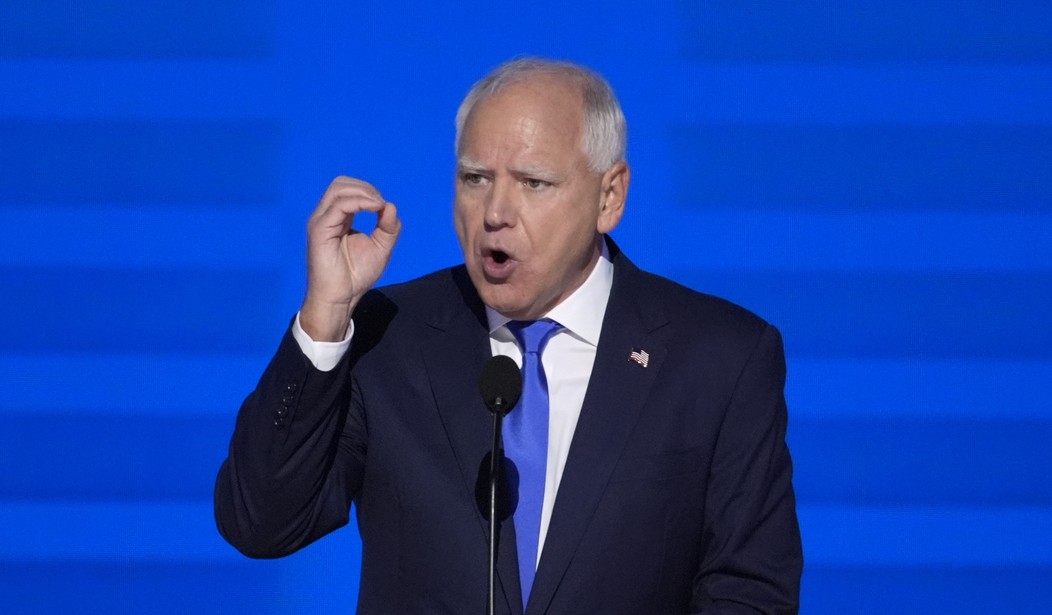What's the opposite of "bounce"?
Kamala Harris chose Tim Walz as a running mate to improve her standing among rural voters, while at the same time shoring up her progressive cred. According to a new Survey USA/KSTP poll, it hasn't even worked out that way in Walz' Minnesota. Since adding the state's governor to the ticket, Harris' lead over Donald Trump has been cut in half in what should be a safe state for Democrats:
After what many consider a successful Democratic National Convention in Chicago where Vice President Kamala Harris and Gov. Tim Walz launched their campaign as running mates, our new KSTP/SurveyUSA poll shows Harris’ lead in Minnesota cut in half from a month ago.
According to our poll, Harris now leads Republican Donald Trump by five points, 48% to 43%, with four percent preferring another candidate and five percent undecided. Last month, Harris, in her first appearance in our poll as the Democratic presidential nominee, had a 10-point lead, 50% to 40%.
Let's start with the primary assumption here, which is that the Democrats had a "successful" convention. Where's the data on that? Harris got a real bounce from the Dump Biden Switcheroo, which seems understandable given Joe Biden's disastrous debate performance. That has been all from base-driven enthusiasm rather than voter conversion, though, and the data after the convention shows Harris and Trump dropping a bit. The betting markets today show Harris slightly trailing Trump, in fact.
Perhaps many shouldn't consider the convention all that successful.
This poll might be one sign that enthusiasm is running dry, even in MN. Since the convention, voters have watched Harris' weak-sauce CNN interview and seen her absolute refusal to engage on policy or with the media otherwise. In other words, this could very well only correlate to Walz joining the ticket rather than being causative.
On the other hand, the New York Post sees some Walz weakness in the crosstabs:
Only 52% of Minnesota voters see him as an excellent or good choice, with 12% saying he’s a fair selection, and a staggering 34% saying he’s a poor pick.
Walz is underwater with men, with 49% approving of his selection and 50% opposing it. About 40% of male respondents called him a poor choice of running mate.
Voters under the age of 35, a key demographic Harris needs in November, also aren’t enthusiastic: 49% called Walz an excellent or good pick; the other 51% regarded him unfavorably. These voters make up 25% of the anticipated November electorate.
Walz is also one percentage point underwater with parents, with 48% regarding him favorably and 49% panning the pick. Among people with children, 35% say he was a poor selection.
Well, oopsie. Who could have predicted that? Anyone who bothered to look at the data from Walz' election in 2022, that's who. Both David and I pointed out within hours of the announcement that Walz only won that election on the strength of the progressive urban areas -- the Twin Cities and its first-ring suburbs, Duluth, Rochester, and maybe Mankato. Walz got blown out in rural and exurban Minnesota. The entire reason for picking Walz had expired in 2018, when he abandoned his Grandpa Tim MN-01 moderate persona and embraced the Academia Tim agenda for his first gubernatorial run. The whole Grandpa Tim and America's Dad spin created by Democrats doesn't sell outside the seven MN counties that dislikes dads and grandpas in the first place, at least politically speaking.
Still, I'd tend to chalk this up to correlation rather than causation. Running mates don't generally have much impact on the ticket, not unless a major scandal gets attached to them. If Harris' numbers are dropping in Minnesota, the most that can be said about Walz' role in that trend is that he's not helping her shore up any support in his own home state, which is the one place a running mate can have an impact.
I'd bet that Josh Shapiro is looking like a better choice in the rear-view mirror to Harris' campaign now, huh?








Join the conversation as a VIP Member